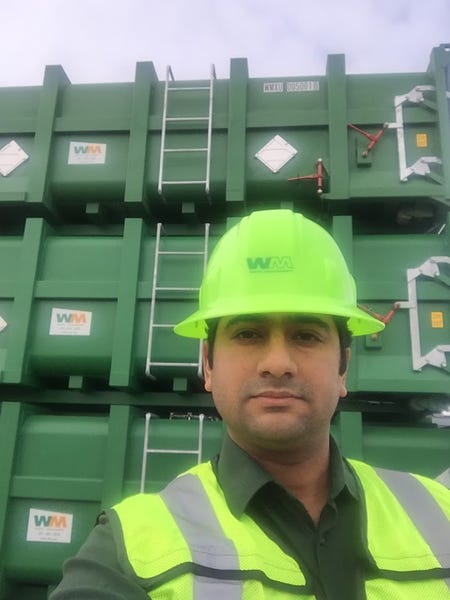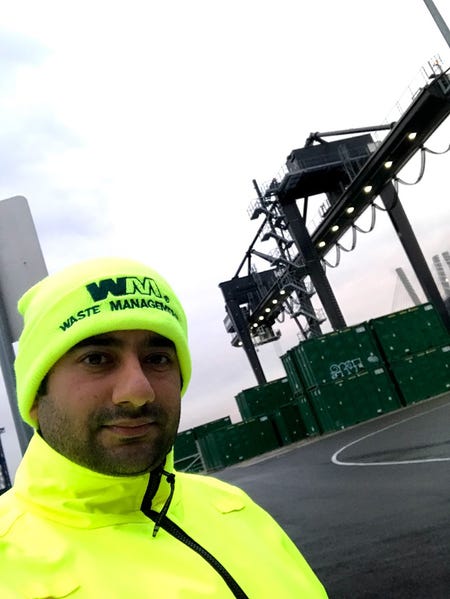WM’s Sharma Leverages Technology to Keep Waste Industry on Cutting Edge
The 2020 Waste360 40 Under 40 award recipient discusses how he thinks technology will continue to shape the waste management industry.

Ashish Sharma has spent 16 years supporting businesses in reaching for their goals through technology, with the past six years in solid waste management. Today, as senior manager of digital at Waste Management (WM), he is helping a key leader in a vital and complex industry stay on the cutting edge while adapting to changing and growing demands.
Among his roles, he leads technology/digital teams and solutions in asset management areas. He has been a digital lead for innovative projects such as New York's marine transfer stations, a $3.3 billion contract whereby large volumes of containerized waste are tracked throughout their lifecycle; Sharma provided the sophisticated technology roadmap to set the stage for success in this challenging, new endeavor.
Additionally, he has led the technology teams in Waste Management’s national accounts business unit. In that role, he created financial, accounting and sales applications that integrate with key customers to support them in meeting their bottom lines.
Sharma is a member of the Solid Waste Association of North America, the Academy of Management and the Software & Innovation Industry Association, among other professional groups. He judges several technology awards and volunteers his time to review technology research papers and software products prior to launch to help companies maximize returns.
“Ashish Sharma has always brought smiles on faces of our technicians, operators, drivers and others, and he always brings positive and good change, which I believe is his biggest achievement. But his achievements have been many, supporting large commercial contracts, providing competitive advantage through technology and continuous improvement,” says Anthony Barna, senior district manager for Waste Management.
“When the going gets tough during projects and day-to-day work, his humility, emotional intelligence and positivity keep everyone focused to achieve the desired outcome,” adds Barna. “His successful completion of several mission-critical projects including predictive maintenance, digitizing daily vehicle inspection report, telematics, technician digital transformation and many others reinforce my confidence in his abilities to positively impact our industry. His demonstrated expertise and thirst for knowledge in emerging technologies will benefit our industry long into the future.”
The 2020 Waste360 40 Under 40 award recipient recently sat down with us to discuss how he thinks technology will continue to shape the waste management industry and which changes in technologies most fascinate him and why. On a personal level, he speaks of how to avoid failure; bouncing back from failure on the occasion it’s inevitable; and growing stronger from it.

Waste360: Can you tell the story of one particularly unique and challenging project? What was your task?
Ashish Sharma: I have been fortunate to work on several unique and challenging projects at Waste Management, but New York’s marine transfer station project to support the City of New York Department of Sanitation’s $3.3 billion contract was by far the most unique and interesting.
Waste Management accepts sealed waste containers from the Department of Sanitation at the Hamilton Avenue and Southwest Brooklyn marine transfer stations. Cranes load the containers onto barges, which are transported to a Waste Management-owned facility in Elizabeth, N.J. From there, containers are transported to a rail yard, where they are loaded onto rail cars for transport to their final destinations.
Full implementation of this project will cut greenhouse gas emissions associated with waste transport by more than 34,000 tons annually, and this project is one of the steps toward the city’s long-term commitment to zero waste.
This was Waste Management’s first experience operating marine transfer stations, and it was a challenging new area where containerized waste was expected to be tracked from these transfer stations to the destinations, throughout their lifecycle. We had to come up with the design to support the new operations. This was a technology-intensive project, which involved collaboration with several stakeholders because of core dependencies and integrations involved, which helped us create the optimal solution to support the operations.
The city outlined its requirements and reporting expectations, which primarily dictated most of the digital strategy conversations, along with the core technology needs to support the project.
Expectations involved tracking the containers as they cycle between the source and destination and back. We piloted a few options and soon realized that passive radio-frequency identification to track the containers and cloud solution to meet the city’s reporting requirements would be the most optimal design. We worked with all stakeholders and integrated our digital solution with vendors and the crane provider for increased efficiency and automation.
Waste360: How do you see technology continuing to shape the waste management industry?
Ashish Sharma: If we look at the past decade and compare it to several decades before that, the technology landscape has changed drastically, and it continues to evolve at a faster pace than we can imagine. One big thing where I truly believe technology will have a bigger role is in closing the gaps on the circular economy.
You see every industry output to a waste stream, and I see technology coming into play to avoid landfilling and put those output waste streams back into the manufacturing process or, in some cases, to reduce output waste streams to zero. Several cities have committed to a zero waste future, and a circular economy is our biggest opportunity to ensure a sustainable and zero waste future, which cannot happen without technology.
Waste360: Can you give an example illustrating how you witnessed technology shaping the industry?
Ashish Sharma: One of the examples is the use of technology to separate contaminants out of the single stream recycling process where robot arms, using artificial intelligence, are helping us reduce the contamination in recyclables.
Waste360: How have you seen the needs of the industry shape how technology is developed to meet those needs?
Ashish Sharma: We only have so much land, so what will happen when the capacity of all of the landfill is capped? This capacity issue is largely being addressed through technology to segregate recyclables from organic waste at the source and through technological improvements in the recycling process as a whole. We also address the issue through customer awareness and education by using technology and gamification to engage them. To sum it up, closing gaps in the circular economy with the use of technology could help us to achieve zero waste.
Waste360: What goes through your mind when you and/or your staff face a failure while working on a tough project? And how do you bounce back?
Ashish Sharma: We work very hard on our projects and give it our best to make each a success story, but the truth is that failure is inevitable in some situations. If it is inevitable, I would rather fail forward and not backward. First, I work to ensure that all of the required steps are taken to maximize the possibility of success.
An important step is using an agile approach; that is, instead of delivering the project in one big bang, we work alongside business stakeholders toward delivering the minimum viable product to avoid the risk of failing big. We change the strategy and pivot if we need to. But, if after launching the product we realize it cannot be adopted as is, we go back to the drawing board and work backward with our customers/business on what they want to redo to make it a success.
Last but not the least, delivering any project is a team effort, and the most important thing is to keep the team motivated and not let anything get in the way. I assume complete ownership of failure should it occur and ensure that the team understands that if we never fail then we haven’t tried anything new or challenging, and I always have their back no matter what.
I create an open environment where the team is committed to doing the right thing, the right way, and there's no need for them to worry about the failure if they gave their best to achieve the outcome in the process.
Waste360: What changes have you seen in technologies within the waste management niche? Which of them most fascinate you and why?
Ashish Sharma: What can’t be measured cannot be cured. Predictive analytics, machine learning and artificial intelligence are playing key roles in shaping solutions to the most complex business problems.
While all these are fascinating to me, technology advancements for safety and the use of technology to ensure employee safety and wellbeing fascinates me the most.

Waste360: What is Waste Management’s Culture Ambassador Committee, and what is your contribution as a member?
Ashish Sharma: We are a group of employees supporting the organization’s “people first” initiatives. The Culture Ambassador represents a local contact who shares the Human Resources Commitments and Values program with employees.
As part of the committee, I deliver periodic huddle. It’s an interactive and collaborative meeting among small groups of employees where I share a consistent message around Waste Management’s values. This enables them to share their stories; it helps for them to become more motivated and engaged within the company.
Waste360: What do you think are the most critical components for a good work culture? How do you go about trying to instill that culture?
Ashish Sharma: The most critical components for a good work culture are trust and integrity in how we relate with our leadership and peers. Embracing and cultivating respect and doing the right thing the right way, and, via the huddles and townhalls, encouraging open communication and discussing the culture objectives while thinking about how to apply them in our routine work activities.
Waste360: What community giving initiatives have you been involved with, and how do you pick the ones you support?
Ashish Sharma: I volunteer for initiatives like:
Loaves & Fishes: Community to help feed homeless and hungry around Downtown Houston.
Project Joy & Hope: Community to prevent and relieve suffering for children with life-limiting conditions and their families.
Community initiatives working toward women empowerment, persons of diverse background and underprivileged to realize their highest potential through coaching, mentorship and motivation.
I grew up in India and come from very humble beginnings, and because of this, the quality of living and equality has always been very close to my heart. I was very fortunate that several people helped me to become who I am today. I believe that if I were not invested, committed and involved in what I do, someone like me would not become who they are destined to become. I do my small bit, and may God give me the strength to continue this journey.
About the Author
You May Also Like




.png?width=300&auto=webp&quality=80&disable=upscale)